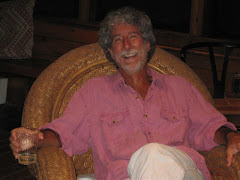Yelapa, Mexico isn't an island although
it might as well be. Tucked in to a protected cove about an hour
south of Puerto Vallarta, it is – for most normal folks – only
reachable by water taxi. Technically, you can get there overland,
but that would take the courage (or, more likely, insanity) of a dirt
bike or the heartiness of an avid and intrepid hiker to traverse the
steep and wildly verdant hills that surround it away from the water.
But, as we shall see, Yelapa is more than just a boat ride away from
Puerto Vallarta; it's decades away. As P.V. is awash in high rises,
Starbucks, and a jumble of high octane traffic patterns, Yelapa is –
how you say – as distant in character as Neptune is from New York.
We began our journey on the shores of
Boca de Tomatlan, a sleepy village with steep cobblestoned streets.
It was here that we intentionally awaited our water taxi long enough
to enjoy a beachside treat of octopus (pulpo) empanadas and a nifty
seafood salad of shrimp, octopus, and avocado that had a freshness
that could only come from a concoction created a moment before we
devoured it. The water taxi was not much more than an oversized
rowboat, if you ask me, but one with a surprisingly hefty outboard
that would throw up rooster tails that might be the envy of many a
jetskier. Along the way, we pass jungle worthy terrain and the
entertaining sight of pelicans perched on idle boats, a man-made
respite from the rolling surf. Forty-five minutes later, we landed on
the beach at Yelapa and jumped into ankle deep water. I really don't
think I had ever had the experience before of dragging my rolling bag
through the sand, but that was the only option to getting the bag to
our hotel, the Lagunita.
At the hotel reception, a small and
preposterously unpretentious outcropping, we meet Luke, the hotel's
owner. Luke, like may here, is an ex-pat. He is from the Chelsea
section of New York, and is as charming as he is laid back, and he is
very laid back. Luke gives me the big picture of Yelapa and I have
this sense that he is always just moments away from a yawn. In
addition, I can't get out of my head how his hooded eyes remind me
way too much of Javier Bardem's in “No Country for Old Men.” He
gives us our room key, instructions on where to refill our water
bottles, and an invitation to breathe slowly and deeply. Our room –
our pelapa – is a bungalow about 7 feet from the beach with a
thatched, and very high, vaulted ceiling and “windows” that have
no glass, just some more thatching that serves as openings to the
world, both in terms of climate and animal life, that can come and go
as they wish. Our bathroom is tiled with rounded ceilings and an
oddly attractive mottled paint job that might well have been done by
Jimmy Hendrix in the days before he hit the big time. At night, all
that separates you from the outside world is a simple hook to keep
the door closed, not what you would normally find, say, in New York.
The bar and the restaurant are in the
sand. What we find there is a fabulous assortment of seafood salads,
ceviche, guacamole, burritos, enchiladas, fish tacos and a good bit
more. And, of course, the Pacifico beer, margaritas, tequila shots
and – my personal favorite – the Cuban rums. The sand is very
tactile to the touch – a natural exfoliant.
It would be a shame not to share this
grand escape with others, and we have done that. We are joined by
Jesse and Laura on the lam from Denver and the daily dosing of stress
and grind in their lives. They're ready. They meet us a few hours
after we arrive, and the party begins.
As P.V. is of modern times, Yelapa is
most defintely third world. No streets as such, just walkways. No
cars, no banks, no ATMs. Our room at the Lagunita brandishes no TV
or phone. Ah, but there is wi-fi, at least if you locate yourself
within ten feet of the hotel office. As tourist meccas go, this one
is one step above primal. When we walk through town, we are met by
quaintness and unadorned local flavor: there is far more hanging
laundry than souvenir shops, far more kids playing with homemade toys
than glitzy boutiques. There are a few restaurants and a disco, but
not the sort that would attract the Michelin Guide. Credit card
usage is rare enough here that a few businesses advertise their
openness to this form of mercantile behavior as if it's a novelty.
As you venture away from the shoreline, you get a grip on how steep
the environment is. The paths work their way upward, sharply. At
the end of one is a waterfall high and scenic with a pool of clear
and cold mountain water. Jesse dives in and gets the full treatment
as the fall's pounding onslaught massages his head and shoulders.
There really isn't much to do here
other than what Luke advertised: the opportunity for deep breathing
and relaxation. A Canadian group from the Yukon we run across at the
hotel is there for a week of yoga and, after a fashion, dancing.
Amusingly, the signs for dogs to be on leashes is totally ignored as
mongrels of a thousand sorts roam the beaches, often playing with
each other in the ocean shallows. Horses appear on the beach.
Paragliders sometimes appear. For mortals like us, we find
contentment in our beach reading, our raucous hearts games, speed
scrabble, and dips in the cenote-styled pool which hangs over the
ocean like the best of infinity pools.
A person could get used to this, no?


No comments:
Post a Comment